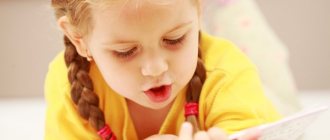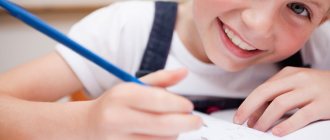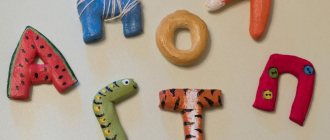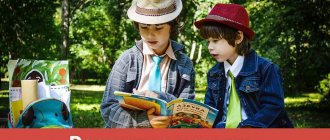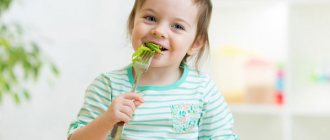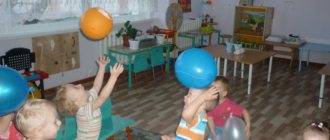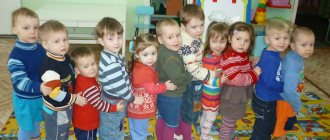Proper preschool preparation is the key to excellent results at school. It would be best if you start preparing from the age of 4, because the school requirements for first-graders are quite high. And if the child has already gone to school and his parents have not worked with him before, then it will not be easy for him. There is a list of specific skills that every first grader must master in order to be ready to learn the necessary material at the school desk. And there are methods that will help parents prepare their babies even at home.
What skills should a first grader have?
What are the requirements of the Ministry of Education for a modern schoolchild? Today, every first grader should be able to:
- introduce yourself and tell a little about yourself and your family members, your interests and hobbies;
- distinguish vowels from consonants, be able to read light text and write block letters;
- list the days of the week, months and seasons;
- tell about morning, lunch and evening;
- perform addition and subtraction of prime numbers;
- distinguish geometric shapes: circle, square, rectangle, star, and also draw them yourself;
- retell a simple text;
- find an extra item among those listed and explain why it is extra;
- dress, undress, wash and make the bed;
- respect and listen to elders, be cultured;
- distinguish colors and shades;
- describe the image;
- count to 20 and back;
- know body parts;
- distinguish between questions: when? Where? Why? And be able to answer them;
- distinguish between animate and inanimate objects;
- peacefully defend your opinion and not get into a fight;
- speak politely and clearly;
- attend lessons quietly and without whims, do not distract other children and listen to the teacher.
These are the most basic requirements and, as you can see, there are many of them. And in order to teach a child all of the above, you must follow some rules:
- increase the load gradually. Give new material only when the child has mastered the old one;
- classes should be short (15-20 minutes maximum), then take a break (15-20 minutes). Let the child rest and engage in physical activity;
- change types of activities so that the child does not feel overworked and bored;
- classes should include game elements. Invite your child to study, don't force him. Explain why a person should be educated. Do not hit or punish your child if he does not want to study today;
- If you use a textbook, let it have a lot of bright and memorable pictures. This way the child will learn the material better and faster.
Gladioli in dacha beds remind us that soon parents and children will again have to gather all their internal resources and go to a meeting with new knowledge and skills.
We are dedicating this week—August 9-15—at our children’s reading festival to preparing for school. Here, together with the Eksmo publishing house, we have collected manuals and reference books, simulators and problem books for preschoolers and primary school students.
| Comprehensive development and preparation for school |
More and more attention is now being paid to preparing children for school. Children of the twenty-first century are constantly surrounded by sources of information independent of parents and educators: television and advertising, gadgets and movies, modern books and toys. Children can communicate with adult lines from movie characters, but may not have the standard knowledge required for first grade. Study guides for different ages will help you check your child’s readiness for school and have time to fill in the gaps.
I am developing my mathematical skills. For children 6−7 years old
475 ₽ 609
The main purpose of the manual is to develop the child’s mathematical abilities. Tasks that comply with the Federal State Educational Standard are given in a playful form and are built on the principle of complication. In one lesson, several types of tasks are offered at once to encourage the child to constantly think and look for new solutions. By completing interesting interactive exercises, the child will not only consolidate and develop acquired skills, but also learn to think outside the box, which will be useful to him in the future.
Look
A manual from the “Lomonosov School” series with interesting tasks, not only mathematical, but also logical. To complete them, children will have to compare, generalize, and draw conclusions. The book will help preschoolers prepare for the perception of school problem books, but still the design and presentation here are more gentle, “childish”. Vibrant illustrations and age-appropriate activities keep things interesting until the very last page. Adult supervision is encouraged, but assistance may not always be required.
Annual course of training sessions: for children 5−6 years old
792 ₽ 1 015
The book includes a full annual course of training sessions for children aged 5-6 years in the main areas of preschool education. By studying just 20 minutes a day, the child will learn the basics of mathematics and literacy, prepare his hand for writing, get acquainted with the world around him, and be able to develop speech, logic, attention, and imagination.
Look
Another preschool textbook from the “Lomonosov School” series is designed for those who are going to enter first grade from the age of 6 or are simply interested in learning. The entire course is divided into different disciplines: “Counting and solving”, “Starting to read”, “Preparing to write”, “Writing block letters”, “Exploring the world around”. This book requires adult participation, but the authors recommend just 20 minutes a day. A “lesson” of this length will not be burdensome for either children or parents.
Annual course of classes. For children 6−7 years old
683 ₽ 876
The book has been prepared in accordance with the new Federal State Educational Standard for Preschool Education and Upbringing and will become an excellent assistant in the education and development of children 6-7 years old. By completing entertaining tasks, arranged in order of complexity and focused on the real capabilities of children of this age, the child will learn to read, count, solve examples and problems, make paper crafts, and expand knowledge about the world around him.
Look
The “Annual Course of Lessons” series, popular with parents, includes manuals for different ages, starting from 2-3 years. For those who are waiting to enter school, a training textbook has been developed that takes into account all the standards of public education. In principle, this manual alone is enough to improve and sort out all the knowledge that will be useful to a future first-grader: a little reading, a little writing, elementary mathematics, paper crafts, atlases. Thanks to the easy presentation of the material, learning is fun and effective. The manual contains tests that will help identify gaps.
| Learning to read using effective methods |
Reading is a basic skill for school. After all, even the terms of a math problem need to be able to read and understand correctly. Putting syllables into words, words into sentences, sentences into meaningful text is a lot of work for a child. And this is the basis for all further training. Here are a few books that will teach your child to read clearly, easily and interestingly.
Primer. Tutorial
414 ₽
The primer is based on the traditional approach to teaching reading in Russian, complementing the traditional approach with an original way of teaching a child to understand the letter combination as an integral graphic element - the syllable as a unit of reading (hereinafter writing). The primer is not of an entertaining or entertaining nature; its task is to provide the child with the fastest possible mastery of reading techniques, which should give children joy and pleasure as a reward for their work.
Look
For more than 20 years, Nadezhda Zhukova’s “Primer Book” has been one of the main textbooks for teaching children to read. Nadezhda Sergeevna Zhukova is a famous speech therapist, candidate of pedagogical sciences, in her books she used both the classical approach and independently developed original time-tested methods. Particular attention in her method of teaching reading is paid to sounds and syllables, and not just letters. There are no games or riddles in this book, but it will give those who learn to read the most important human skills for life. And the sooner this happens, the more time the child spends with books, the easier it will be for him at school.
We read after “The ABC with large letters”
359 ₽ 460
Has your little one just turned the last page of The ABC's? Congratulations! The first steps have been taken. Now there is a long way ahead: you need to learn to read correctly, quickly and expressively, well understanding what you read. It turns out that you can do this with pleasure, just by playing. Specially composed exercises and interesting texts, a huge number of exciting games and beautiful illustrations await you on the pages of this book.
Look
If a child has finished studying the first “ABC” and learned to read syllables, it is too early to rejoice. You should not immediately burden the young reader with voluminous texts with secret meanings and highly artistic expressions. In order not to frighten off the child’s interest and self-confidence, the texts should be selected very delicately: short, simple, understandable. This book is divided into activities, moving from one to the next logically, so flipping through the pages is not recommended.
| Exercise equipment for younger schoolchildren |
Like sports equipment that strengthens muscles, training machines allow you to repeat and reinforce knowledge. The exercises in them differ from ordinary school textbooks in their playful approach.
Let's develop logic. Games and puzzles
172 ₽ 221
The main objective of the manual is to develop students' logical thinking. The ability to draw conclusions based on available facts, highlight the main thing in the flow of information, find similarities and differences between objects, actions, phenomena, work according to instructions, understanding its meaning, is necessary in life just like the ability to observe hygiene and traffic rules.
Look
This manual was published in the “Working with a Neuropsychologist” series. The area of research of neuropsychologists is speech, memory, attention - the foundation on which the rules of the Russian language and mathematics, traffic and interaction with nature will lie in the head of a first-grader. Such a simulator will teach the child to effectively perceive a large amount of new information at school. While completing the tasks of this, the child will have to think, draw analogies, draw conclusions and analyze. The series of benefits “Working with a Neuropsychologist” is aimed at the comprehensive development of the child.
Russian language. 1 class. Exercise book. Federal State Educational Standard
172 ₽ 221
The main objective of the manual, which complies with the Federal State Educational Standard, is to consolidate the knowledge acquired at school on the main topics of the Russian language: text and sentence; meaning of the word; dividing words into syllables; accent; transfer; vowels and consonants sounds and letters; letter combinations zhi-shi, cha-sha, chu-schu, chk-chn-cht; capital letter in proper names.
Look
The manual is part of a series of exercise books for elementary schools. This notebook is intended for first grade students studying Russian according to any of the approved programs. The structure of the manual is very convenient: before each exercise, a rule and a hint for completing the task are given. The use of such a notebook allows you to repeat the material covered, fill gaps in knowledge, and bring the skills of parsing words and text to automaticity, which will undoubtedly affect the student’s academic performance and self-esteem.
Addition and subtraction. 1st-4th grades
116 ₽ 149
The simulator contains tasks aimed at repetition and bringing to automaticity the skills of addition and subtraction within 100. Each block is followed by developmental and creative tasks, the purpose of which is to instill in the child an interest in mathematics. Motivational sayings from a funny Mobile character will help a student gain confidence or just make them smile. The manual can be used when repeating and consolidating material, in preparation for tests and independent work.
Look
This simulator is called “mobile” because it is the size of a mobile phone, opens like a notepad and the character “mobile” gives parting words. Such flirting with the children's audience allows you to attract the child's attention and interest in mathematical tasks. The simulator is designed for schoolchildren in grades 1–4 who can add and subtract within 100. On the back of each mathematical exercise there is a game so that the child can alternate between studying and relaxing. In the series you will find manuals for practicing various skills that a child masters in elementary school.
| Reference books for elementary school |
For elementary school students, it will be useful to use various reference books, which sometimes help parents in explaining the material to their child. Particularly convenient are those that briefly and clearly present all the necessary material.
The entire primary school course in diagrams and tables. 1-4 grades. Federal State Educational Standard
458 ₽ 587
The book contains material on the main subjects of primary school - Russian language, mathematics, the environment, English. Rules and definitions are combined into visual logical blocks, diagrams and tables that allow you to better assimilate and understand the information. In addition, practical tasks are provided for repetition and consolidation of acquired skills.
Look
A very conveniently structured program for grades 1–4 in the main subjects: Russian, mathematics, the world around us, English. Allows you to quickly find the desired rule or topic, remember basic terms and concepts. Such a reference book will also be useful to parents of schoolchildren, so that they can help their children with lessons using the modern system, because it is sometimes very different from the presentation of knowledge thirty years ago.
How to prepare a child for school from 5 to 7 years old?
Today it is important not only to teach your child letters and numbers, but also to begin all-round development. The baby should be comfortable in the company of the same age. In addition, you need to approach this matter extremely carefully so that the child does not lose the desire to study further. Many parents begin to prepare their son or daughter for school quite persistently, and then do not understand why the child shows no interest in studying at all.
In kindergartens it is much easier to prepare children for school, because they are already in a children's group, building a daily routine and getting used to classes. Remember that a prepared child will not only do well in the program, but will also become the life of the party. And if the child does not have some skills, then among his peers he may be considered an “outsider.” If you decide to prepare your child for school on your own, read the recommendations below:
When to start preparing
Going to school is always exciting for both adults and children. Some parents begin preparation in advance so that by the first grade the child has already mastered the skills of reading, writing and counting. There is another category of adults who believe that teaching everything is the task of teachers. Such parents spend almost no time preparing their children for school. Which one is right? There is no correct answer, as well as a clear solution. Each family chooses for itself, based on its capabilities and the abilities of the child.
What happens if a child is not prepared for school? Nothing terrible. In first grade, children will be taught to read, write, and count. But in this case, parents should be prepared that the child may lag behind classmates who have already mastered these skills. A first grader who is learning about letters and counting will have more difficulty with assignments, and homework will take longer. This situation is not conducive to success and can result in such a strong decrease in interest and motivation to learn that the child no longer wants to go to school. Therefore, most parents try to prepare their children for first grade in advance.
Reading training
Pay attention first of all to reading lessons. After all, if your baby masters the basics of reading, it will be easier for him to learn other subjects. Start by learning the letters (preferably in alphabetical order). Remember the elements of the game and try to sculpt each letter from plasticine or clay. Ask your child what this letter looks like.
Read a simple text together and ask your child to find the letters you studied today. Afterwards, you can invite the child to retell the selected text or at least answer the questions.
Math teaching
When the baby is still 2-3 years old, you can gradually begin to teach counting. Count together steps on a walk, toys at home, candies and fruits. Afterwards, you can show your child the counting sticks and start counting them.
It is very effective to learn numbers in pairs (2 and 3, 4 and 5). This will make it easier for your child to understand adding numbers. When you start explaining to him the rule for adding one, it will not be difficult for him to tell you the correct answer. Take one digital pair per lesson, but before taking new material, review what you have covered.
Geometric shapes can be easily and interestingly studied using cookies of different shapes. Start with simple shapes: circle, triangle, square. The store today has cookies to suit different tastes and budgets.
Once you are familiar with simple shapes, you can learn to draw them.
Remember that you will achieve greater results if you alternate activities between each other.
Teaching writing
Children's hands are not at all ready to write. Here parents will have to try hard to train their son or daughter.
During preparation, exercises and games to develop fine motor skills will play an important role. Already at two years old, you can give your baby different pasta, cereals, some beads and play with him (of course, make sure that the baby doesn’t put anything in his mouth). You can also try tying your shoelaces together and massaging your arms.
Buy children's scissors with rounded ends at the store and show your baby how to use them. Let him try to work with them himself.
When learning to write, start by writing block letters. They are easier to learn, and only then move on to capital letters. Make sure your child practices regularly and teach him not to go beyond the lines on a sheet or notebook. And for this important task, you can buy a good and comfortable pen for the child so that he does not experience discomfort when writing.
There are excellent finger exercises that help kids stretch their hands during breaks between training: “The fish in the lake were splashing in the quiet, warm water. They will either shrink, unclench, or bury themselves in the sand.” At the same time, let the child actively move his fingers and the entire arm.
Buy a notebook from the store that will meet all school requirements. There are a lot of them on the shelves today. Let your baby gradually get used to the attributes of school.
School preparation program from IQshi
The website for the harmonious development of IQsha will help you effectively prepare for school, anywhere in the world. IQsha offers many exercises in a playful way to develop logical thinking, speech, reading, and counting skills. This way you can diversify the learning process and make it easier and more fun.
The most important thing is to be attentive and patient with your child, take into account his wishes, and do not race for success, looking at the achievements of other children. First of all, it depends on the parents what kind of attitude the future first-grader will have towards school. Be warm, accepting mentors, talk to your child more often and be interested in what emotions he is experiencing, trying to show as much participation as possible. Don't make school preparation your number one goal. Play, walk, have fun and turn your lessons into fun, playful activities that will help you develop your skills in a fun and stress-free way.
Creativity training
Purchase in advance a starter kit for creative activities: an album, brushes, paints, pencils and felt-tip pens. To begin with, let your child practice coloring coloring pages. Buy several close-up coloring books with different themes (preferably one that your son or daughter likes). Explain that the baby should not go beyond the lines, let him learn to be careful now.
It will be great if you study some geometric figure the day before and then color it together. Or, on the contrary, draw a watermelon or an orange, and then ask your child what shape it has.
Do different activities: draw, paint, sculpt, cut out. This way the child will learn the material covered even better.
Psychological readiness for schooling.
Every child reacts differently to school and the need to attend school every day. However, scientists say that adaptation to school is better when the child has the necessary school skills:
- the baby has an interest in knowledge;
- the child learned to analyze and compare objects and concepts;
- know that at school the child also learns communication skills and awareness of goals.
- the child is concentrated and interested in what he is learning;
- problem solving, overcoming difficulties.
Remember that you can prepare your child for school without turning to a child psychologist for help. Many of the exercises are quite simple so that you can do them at home. But you will have to follow some tips:
- communicate with your baby. Do this while you write, decide, read. Discuss the material covered regularly.
- read more fairy tales and stories and ask some questions later. Let your child learn to analyze what he read, retell the plot to you, or at least name the main characters. Ideally, the child should express his personal opinion about what he read.
- Together with you, your child will begin to understand what school is and how important it is to study. Don’t forget to praise your baby and encourage him, even if he doesn’t succeed in everything right away. After some time, try to switch roles and now let your son or daughter be the teacher, and you the student.
- Never finish your child’s work, teach him to be independent. The maximum you can do is help him (collect toys, get dressed, wash his face)
- Allow the child to independently perform those actions that he strives for and knows how to do. Children are very inquisitive and at a certain age they want to do many things themselves. If you control him all the time and don’t give him freedom, then the child will never learn to eat on his own, tie his shoes, or make his bed. And this, in turn, can cause ridicule in kindergarten and school. And vice versa: the more your child demonstrates independence at home, the more skillful and independent he will be in kindergarten and elementary school.
- Teach your son or daughter to communicate with peers. It is especially difficult for children who do not have brothers and sisters. They have difficulty understanding what it means to share, play together, and not fight. Invite guests to your home or arrange games right in the yard.
- try not to laugh at your child when he doesn’t succeed and refrain from making comments. Children at this age are very vulnerable. From the ridicule of loved ones, a child may develop low self-esteem and an inferiority complex.
- Don’t force your child to study, but motivate him. Tell us how many new and interesting things he can learn in class. This way the material will be absorbed easier, and the baby will study with pleasure.
- teach your child discipline gradually. Explain to him that when the teacher speaks, you need to listen to him and there should be silence in the lesson.
- Explain to your child that he should ask questions to the teacher if he doesn’t understand something from the new material. There is no shame in asking, it is a shame not to know and not to strive to find out.
- Help your child develop self-esteem. Some kids are too aggressive, and some are too calm. Both one and the other can harm the baby in the children's group. Tell your child that different situations may arise at school. You can even play out scenarios of different conflicts and see how ready your child is to solve problems on his own. Help your child do the right thing in a controversial situation. Listen to what he would do in the current situation, and then express your point of view. In any case, you will have to help your son or daughter do the right thing.
Psychological preparation of a child for school at home
The psychological component of the guide on how to prepare a child for 1st grade is very important. It includes several components, among which the following stand out: volitional, personal, intellectual. The readiness of the child's willpower is necessary in order for him to be able to complete the various tasks presented in the lesson. The baby will have to do not only what he wants, but also what is required.
The second component is characterized by the fact that the baby has a new social role, which he must correctly perceive. Parents should develop in him such personality traits that will help him easily get in touch with classmates and teachers. The development of intellectual abilities affects the extent to which the material presented during classes will be absorbed.
Important! The child must correctly understand his role in learning.
Psychological balance
Child health and school
Separately, it is worth discussing the issue of the health of a child who is preparing to go to school. While parents are busy educating their child at home, they often forget about his health.
6-7 years is a period of active changes in the body of every child. Usually at this time, baby teeth change and growth of the whole organism occurs. At this age, children need more physical activity. If a child must sit at a desk, then it is better to send him to school at the age of 7 (from a health point of view, this will be better for the baby). If you do send your child to school at age 6, carefully study what physical training the school offers. It is very good if the school has a swimming pool and an equipped gym, because a growing body requires physical activity several times a week for the heart, blood vessels and joints to function properly. In addition, we remember about changes between lessons. During this time, the student should rest outside the classroom, and the room should be ventilated.
The parent, in turn, can provide the child with regular rest before school. Every child needs a break from:
- communicating with a large number of people;
- catering;
- large amounts of exhaust gases and household chemicals.
According to doctors, the best vacation for a child is in the village with his grandmother. Only there today the maximum amount of fresh air, most of the products from your garden and vegetable garden are preserved, and the child will spend a lot of time in nature. This way he will develop immunity to new viral diseases and infections, the child will spend his days actively and take a break from the bustle of the city.
Develop your child at home and help him explore the world around him. Remember that every child is individual, but all children must master certain skills by the age of 6-7 in order to cope with tasks at school, learn new things every day and communicate with peers.
How to prepare your child for school on your own?
Studying at school changes the entire routine life of a child. Is it possible to prepare your baby for a new stage on your own? Certainly! The main thing is to stock up on time, desire and patience. Preparing for school is a long process, which consists not only of learning to read and write, but also of psychological support for the future first-grader.
When choosing to prepare for school in a developmental studio or preparatory class, it is important to understand that only knowledge can provide there. They do not teach discipline and daily routine. But the preparation itself in the studio is more effective, because the preschooler is in a group and quickly learns new information.
For busy parents, there is another alternative - online classes. Is it possible to entrust this important process to online child development services and be confident in the results? More likely no than yes.
The advantage is that the child will study independently, because all classes are designed in an accessible and fun way. But adults must monitor the learning process and check how well the preschooler learns information.
Therefore, online services are excellent assistants, but they cannot completely replace classical training. The best training option is combined, when the child studies at home and in a preparatory studio or on child development sites.
